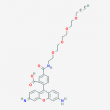
Carboxyrhodamine 110-PEG4-alkyne - 500mg
Short description
Carboxyrhodamine 110-PEG4-alkyne: A Versatile Linker for Targeted Protein Degradation
Carboxyrhodamine 110-PEG4-alkyne, a high-purity (98%) compound, is a powerful tool for the synthesis of proteolysis-targeting chimeras (PROTACs). This polyethylene glycol (PEG) derived linker boasts a molecular weight of 587.62g/mol and a density of 1.31G/Cm3, making it an exceptional choice for your advanced research needs. Crafted with precision, this solid compound in a vibrant color offers a unique blend of reactivity and selectivity, unlocking new possibilities in targeted protein degradation. Leverage its versatility to elevate your experiments and drive your scientific endeavors to new heights.
In vitro: PROTACs contain two different ligands connected by a linker; one is a ligand for an E3 ubiquitin ligase and the other is for the target protein. PROTACs exploit the intracellular ubiquitin-proteasome system to selectively degrade target proteins.
- CAS: 2055103-66-5
- Ref #: TM-T14874
- Purity: 98%
- Molecular Formula: C32H33N3O8
- Color/Form: Solid
-
Procurenet Team Tshim Sha Tsui
Hong Kong 3 years
Description
Carboxyrhodamine 110-PEG4-alkyne
Carboxyrhodamine 110-PEG4-alkyne is a versatile and highly specialized chemical compound that has garnered significant attention in the scientific community. This polyethylene glycol (PEG) derived linker is a crucial component in the synthesis of proteolysis-targeting chimeras (PROTACs), a revolutionary approach in drug discovery and development.
At its core, Carboxyrhodamine 110-PEG4-alkyne is a meticulously crafted molecule that combines the power of rhodamine 110, a fluorescent dye, with a PEG4 linker and an alkyne functional group. This unique combination of features makes it an invaluable tool for researchers working in the fields of biochemistry, cell biology, and medicinal chemistry.
The rhodamine 110 moiety within the compound serves as a highly sensitive and selective fluorescent marker, enabling researchers to track and visualize the behavior of target proteins in complex biological systems. The PEG4 linker, on the other hand, provides a flexible and hydrophilic tether, facilitating the attachment of the compound to various biomolecules, such as proteins or small molecules, without compromising their functionality.
The alkyne group present in Carboxyrhodamine 110-PEG4-alkyne further enhances its versatility, as it can undergo click chemistry reactions, allowing for the efficient and site-specific labeling of biomolecules. This versatility makes the compound a powerful tool in the development of PROTACs, which rely on the selective degradation of target proteins to achieve their therapeutic effects.
PROTACs are a revolutionary approach in drug discovery, as they exploit the intracellular ubiquitin-proteasome system to selectively degrade target proteins. By utilizing Carboxyrhodamine 110-PEG4-alkyne as a linker, researchers can create highly specific and potent PROTACs, opening up new avenues for the treatment of a wide range of diseases, from cancer to neurodegenerative disorders.
Product Features
- High purity (98%) for reliable and consistent results in research applications
- Unique combination of rhodamine 110, PEG4 linker, and alkyne group for versatile labeling and PROTAC synthesis
- Fluorescent properties of rhodamine 110 enable tracking and visualization of target proteins in complex biological systems
- PEG4 linker provides flexibility and hydrophilicity, facilitating the attachment of the compound to biomolecules
- Alkyne group allows for efficient click chemistry reactions, enabling site-specific labeling of biomolecules
Product Specifications
- CAS Number: 2055103-66-5
- Reference Number: TM-T14874
- Purity: 98%
- Density: 1.31 g/cm³
- Molecular Formula: C32H33N3O8
- Molecular Weight: 587.62 g/mol
- Color and Form: Solid
Long-term Storage
For optimal storage and preservation of Carboxyrhodamine 110-PEG4-alkyne, it is recommended to store the compound as a powder at -20°C for up to 3 years. If stored in a solvent, the recommended storage temperature is -80°C for up to 1 year.
In Vitro Applications
Carboxyrhodamine 110-PEG4-alkyne is a crucial component in the synthesis of proteolysis-targeting chimeras (PROTACs), a groundbreaking approach in drug
Specifications
- Color form: Solid
- Density: 1.31G/Cm3
- Formula: C32H33N3O8
- Long term storage: Powder: -20°C for 3 years | In solvent: -80°C for 1 year;
- Molecular weight: 587.62
- Notes: In vitro: PROTACs contain two different ligands connected by a linker; one is a ligand for an E3 ubiquitin ligase and the other is for the target protein. PROTACs exploit the intracellular ubiquitin-proteasome system to selectively degrade target proteins
- Purity: 98%





